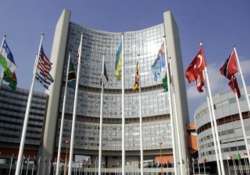UN Atomic Watchdog Condemns Iran
Vienna, Nov 19: The UN atomic watchdog's board passed today a resolution of “deep and increasing concern” about Iran's nuclear activities after a damning new report from the Vienna-based body.But the text, proposed at the

Vienna, Nov 19: The UN atomic watchdog's board passed today a resolution of “deep and increasing concern” about Iran's nuclear activities after a damning new report from the Vienna-based body.
But the text, proposed at the International Atomic Energy Agency by the five permanent members of the UN Security Council, Germany and 12 others, stops short of reporting Iran to New York or setting Tehran a deadline to comply.
The resolution said it was “essential for Iran and the Agency to intensify their dialogue” and calls on Tehran “to comply fully and without delay with its obligations under relevant resolutions of the UN Security Council.”
A total of 32 countries on the 35-nation IAEA board of governors that includes India, voted in favour, with Indonesia abstaining and Cuba and Ecuador voting against, diplomats said.
But to assuage Chinese and Russian misgivings, the resolution has no timeframe for Iran to comply, calling instead for IAEA head Yukiya Amano to report to the board in March on Tehran's “implementation of this resolution.”
Last week, the IAEA came the closest yet to accusing Iran outright of seeking to develop nuclear weapons, in a report immediately rejected by the Islamic republic as “baseless.”
The US envoy to the IAEA, Glyn Davies, told the board today that the “watershed report ... leaves little doubt that Iran, at the very least, wants to position itself for a nuclear weapons capacity.”
He rejected criticism that the resolution was too weak. “This resolution does the job,” Davies told reporters. “It gives us the tools we need to get the job done.”
Britain, France and Germany said in a joint statement they were “gravely concerned” by the report, saying it “paints a very disturbing picture ... The international community cannot simply return to business as usual.”
But Iran's envoy Ali Soltanieh said it was“unprofessional, unbalanced, illegal and politicised” and has “deeply ruined the worldwide reputation of the Agency as a technical competent authority.”
He told reporters that Iran would not suspend its uranium enrichment activities and that the resolution would only serve to strengthen its resolve.
“It will be business as usual ... We will continue our work as before,” he said, accusing Amano of making a “historical mistake.”
The report laid bare deep differences within the so-called P5Ư bloc dealing with the Iran question, the five permanent members of the UN Security Council—the United States, China, Russia, Britain, France—and Germany.
Washington, Paris and London jumped on the IAEA report as justification to increase pressure on Iran, already under four rounds of Security Council sanctions and additional US and European Union restrictions.
But Beijing, which relies heavily on Iranian oil imports, and Moscow, which also has close commercial ties and built Iran's only nuclear power plant, have been more cautious.
Israel's ambassador Ehud Azoulay yesterday expressed disappointment at the resolution, having hoped for a stronger response and even what would be a fifth round of sanctions, saying the resolution “could be tougher.”
But Western diplomats stressed all major powers had agreed, thus avoiding what would have been a potentially damaging split in the UN Security Council, where relations have already been tested this year over Libya and Syria.